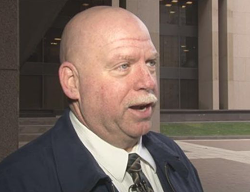Thursday, the Cleveland branch of the NAACP sent a letter to Cleveland Police Patrolmen’s Association President Steve Loomis, requesting that he resign from his post on the Cleveland Community Police Commission.
The request was a direct result of Loomis’ fiery comments Tuesday afternoon. In a press conference, Loomis harshly criticized the police department and the city of Cleveland for conducting what he called a “results-based” internal investigation of 13 officers who discharged their weapons during the Nov. 2012 police chase.
The investigation resulted in the firing of six Cleveland police officers, including Michael Brelo, and the suspensions of six more for their roles in the chase and shootout, during which 137 shots were fired.
“This was a kangaroo court,” Loomis said Tuesday. “They put a hat together and pulled names from a hat to get the numbers they wanted… I promise you all six officers are going to get their jobs back.”
Michael Nelson, president of the NAACP’s Cleveland branch, called Loomis’ remarks “inflammatory and divisive,” and said that his position on the Community Police Commission, established by the Consent Decree, represented a conflict of interest.
“You cannot advocate for police reform, and at the same time defend individuals who for all intents and purposes, violated every tenent (sic) of their training and obligation to serve and protect all citizens, including Malissa Williams and Timothy Russell,” Nelson said in his letter to Loomis.
“You have the right and the obligation as the President of your union to represent your members, but to attempt to absolve the officers of any culpability on one hand, and then suggest on the other that the victims were killed because they were high on cocaine and marijuana ignores the reality of due process that every human being is entitled to.”
Loomis called Russell and Williams “bad guys” in his remarks, and said that though he expected to take heat for saying so, their deaths were the result of choices that they made.
Nelson and other local activists intended to hand deliver the letter to Loomis Wednesday night, when the Community Police Commission met at the Harvard Community Center, but Loomis was not in attendance. Loomis told Scene in a phone interview that he was dealing with the aftermath of the disciplinary actions — including putting together a GoFundMe campaign for the six fired officers — and he simply didn’t have time to attend.
Messages seeking comment were left with the Community Police Commission’s Chair Dr. Rhonda Williams, and the CPC’s main contact phone number.
Michael Nelson concluded his letter by pointing out what he viewed as a central irony in Loomis’ Tuesday remarks:
“You do recognize that the reform of the Cleveland Division of Police, the Consent Decree and the commission on which you serve are all a direct result of the conduct of the police on that night? The conduct which you are defending? You also realize that one of the goals of reform is to improve the relationship between the community and the Division of Police, not destroy it?”
The letter was delivered not only to Loomis himself, but to the City of Cleveland, the Cleveland Police Monitoring Team, the Department of Justice, and the Community Police Commission itself.
That commission was established by the Consent Decree to make recommendations to the police department on behalf of citizens and to improve communications between the department and the communities it serves. The CPC’s ten community representatives were selected in September from a pool of nearly 200 applicants. Each of the city’s three police unions also appointed a member. Members serve four-year terms.
When we talked to Loomis Thursday afternoon, he said he hadn’t yet read the NAACP’s letter.
“And I don’t care about it,” he said. “The CPPA’s being on that Commission is part of the Consent Decree and I’m gonna remain on there. I’ll resign when Rhonda Williams, Dylan Sellers and Amanda King resign.”
Williams founded the Social Justice Institute at Case Western Reserve and serves as the CPC’s co-chair. Amanda King is a law student at Case and works in the graduate department of multicultural affairs as a diversity coordinator. Sellers is an activist with the Children’s Defense Fund and the New Abolitionist Association.
The Consent Decree does indeed stipulate that a member of the CPPA must be represented, but not necessarily the president. Might another representative from the union be less controversial, Scene asked.
“It’s my discretion,” said Loomis. “And I picked me, because I wouldn’t subject one of my members to that farce of a commission. We [the police union reps] went in there with an open mind, but they’ve accomplished nothing. You’ve got members of that commission who are just looking to promote their own agendas.”
Loomis said that the public meetings are often overtaken by public comment from a small but devoted contingent of activists and that restrictions in how the members discuss issues — Loomis said members are only granted two minutes to speak, and can only speak once — preclude meaningful conversation.
Two of the ten appointed committee members have already resigned, (CSU’s Marshall Law School Dean Craig Boise and the Rev. Max Rodas), and Loomis said he wouldn’t be surprised if more people bow out as well.
“But I promise you, I’m not leaving. Not until the moment Rhonda, Dylan and Amanda do.”


